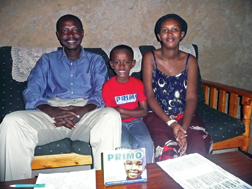The NMCP, with support from PMI, made AL available through private sector pharmacies nationwide at a subsidized price of $0.55.

Isaac Munkotanyi (center), who has suffered from malaria many times, recovered quickly after being treated with the ACT artemether-lumefantrine, marketed under the brand name PRIMO. Source: PSI Rwanda
Rwanda converted to AL as the first-line antimalarial treatment in 2006 and rapidly scaled up access in health facilities, but this did not benefit the 40 percent of patients who were treated by community health workers and the private sector. AL was available in only 6 percent of Rwanda’s pharmacies, primarily in the capital, and at an average price of $8.10 per treatment, it was priced well above what most Rwandans could afford to pay. If Rwanda was to achieve its goal of treating 80 percent of childhood fevers with an effective ACT within 24 hours, Rwanda needed to make AL more readily available.
The NMCP, with support from PMI, made AL available through private sector pharmacies nationwide at a subsidized price of $0.55. A protective envelope for the drug with pictures and information in the local language was developed and launched under the brand name PRIMO. The innovative protective envelope provides low-literacy consumers with instructions they can understand and encourages correct and prompt treatment of childhood fevers.
PMI worked with the NMCP and the national Pharmacy Task Force to train pharmacy staff as a precondition for accessing PRIMO at subsidized prices. Sales were supported by behavior change communication activities that described the symptoms of malaria, appropriate treatment-seeking behavior, and PRIMO as the most effective drug for the treatment of uncomplicated malaria. With more than 60,000 PRIMO treatments sold to private sector pharmacies in 2008, access to AL increased significantly.
According to John, “The doctor told us all about PRIMO and how we could find it in the pharmacy near our home. We were surprised to find it there at an inexpensive price. After three days, Isaac was completely better; he regained his appetite quickly and, since then, we have told people in our village about PRIMO. The next time a child has a fever, we know we can treat it quickly with PRIMO, which is easy to find!”
